Curmudgeonly Looking into the Past to Divine the Future—That Nagging Privacy Issue—Debunking the Elephant
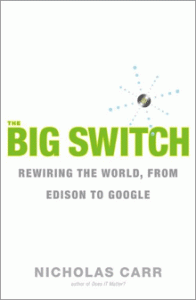 The Big Switch is a valuable book that reflects what has become Nick Carr’s trademark role, heckling IT and Web enthusiasts, albeit from good seats. Carr seems to relish his role as “the fly in the ointment” of the idealistic IT-enabled world that Web missionaries espouse. Although this book has shortcomings, I recommend it for two reasons. First, Carr makes a convincing and useful argument that the “electrification” of business and society (the Edison part) has valuable lessons for the “computerization” transformation of business and society (the Google part) that is currently unfolding. This parallel provides context to think about some of the disruptions around your business, society and career. Second, Carr raises serious questions about possible privacy implications of computerization. He palpably weighs in on the dark side and seems to want the world to change course from the “googlization of life.” If you haven’t read The Long Tail, I would read these books in proximity because they are very complementary and both quick, important reads. The Big Switch is a valuable book that reflects what has become Nick Carr’s trademark role, heckling IT and Web enthusiasts, albeit from good seats. Carr seems to relish his role as “the fly in the ointment” of the idealistic IT-enabled world that Web missionaries espouse. Although this book has shortcomings, I recommend it for two reasons. First, Carr makes a convincing and useful argument that the “electrification” of business and society (the Edison part) has valuable lessons for the “computerization” transformation of business and society (the Google part) that is currently unfolding. This parallel provides context to think about some of the disruptions around your business, society and career. Second, Carr raises serious questions about possible privacy implications of computerization. He palpably weighs in on the dark side and seems to want the world to change course from the “googlization of life.” If you haven’t read The Long Tail, I would read these books in proximity because they are very complementary and both quick, important reads.
As […]
Review and Analysis of the twenty-first century’s first decade, how Web 1.0 and Web 2.0 are disrupting executives, enterprises, society and government.. crowdsourcing, collaboration, innovation, privacy, globalization, terrorism, organizational unbundling, and how to thrive in the Knowledge Economy’s accelerating volatility, which will spell the end of many Industrial Economy enterprises. […]
This Web 2.0 adoption curve helps commercial and government executives make investments in social networks, social media and Web 2.0 in 2009 and 2010: use this realistic adoption model to manage expectations and risk. […]
Reexamining “Content” in Light of “Conversation”
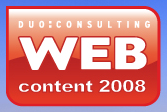 Web 2.0 is redefining content on the Web, and Duo Consulting’s and Content Wrangler’s Web Content 2008 Chicago, convened at the UBS Tower on June 17-18, 2008, was a rich opportunity to check in with the Web 1.0-Web 2.0 mashup. Embedded within the legacy concept of “content” (text, pictures, audio, video, etc.) is that few people create it and many people consume it, which is obviously less true with every passing month. Web 2.0 is redefining content on the Web, and Duo Consulting’s and Content Wrangler’s Web Content 2008 Chicago, convened at the UBS Tower on June 17-18, 2008, was a rich opportunity to check in with the Web 1.0-Web 2.0 mashup. Embedded within the legacy concept of “content” (text, pictures, audio, video, etc.) is that few people create it and many people consume it, which is obviously less true with every passing month.
Something else is happening on the way to the forum, too: opinions about content are gaining more attention than the content itself, according to Day One keynote Dick Costolo. If so, where does that leave people who “manage” content? There is a whole ecosystem of professionals and vendors that manage content according to Web 1.0 rules, and many of them were here, sharing their visions and tactics for embracing Web 2.0. Day Two keynote Jerome Nadel provided a clue: a shift in emphasis to design: since “users” are creating the opinion content through their “conversation,” I’ll hazard that a key part of […]
“Yes,” Says Team of Healthcare Experts, Employer CEOs and Patient Representative at the Executives’ Club of Chicago, “But You Must Change Your Ways”
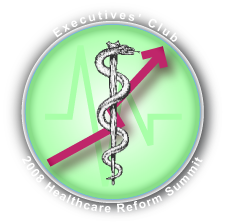 Honestly Assessing Quality—Engaging Consumer Empowerment—Trading in the Ferrari for a Chevy Honestly Assessing Quality—Engaging Consumer Empowerment—Trading in the Ferrari for a Chevy
The Executives’ Club of Chicago convened its healthcare reform summit at the Hilton Chicago on 20 February 2008, drawing on diverse expertise. Ian Morrison, Ph.D., healthcare futurist, gave the keynote and moderated two panels: first, the healthcare expertise panel with Dean Harrison, CEO Northwestern Memorial Healthcare; William Novelli, CEO AARP; Scott P. Serota, CEO BlueCross BlueShield Association; and second, the business executive panel with Andrew M. Appel, Chairman AON Consulting; John A. Edwardson, CEO, CDW; John B. Menzer, Vice Chairman and Administrative Officer, Wal-Mart Stores. Robert L. Parkinson, CEO, Baxter Healthcare gave an insightful point of view on recommended actions to close the event.
There was broad agreement that the U.S. healthcare system was broken, and speakers offered excellent insights and perspectives about how to fix the system. However, what they didn’t say was as interesting as what they did, and I will address two key issues in […]
Web 2.0 Impact on 2008 U.S. Presidential Election Declared Minimal at Executives’ Club, but cantankerous subtext hints at possible monkey wrench—democratic race in spotlight.
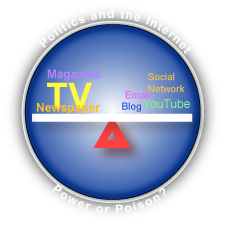 The Executives’ Club of Chicago fielded an expert panel to brief Midwest executives on Web 2.0’s current and likely impact on one of the most watched U.S. elections in recent history. Marie Cocco, a renowned political columnist, Peter Greenburger, Director of Google’s Elections & Issue Advocacy Team, and Alan Webber, Senior Analyst of Forrester Research brought to bear diverse perspectives on the question at the event, which took place at The University Club on January 31, 2008. The Executives’ Club of Chicago fielded an expert panel to brief Midwest executives on Web 2.0’s current and likely impact on one of the most watched U.S. elections in recent history. Marie Cocco, a renowned political columnist, Peter Greenburger, Director of Google’s Elections & Issue Advocacy Team, and Alan Webber, Senior Analyst of Forrester Research brought to bear diverse perspectives on the question at the event, which took place at The University Club on January 31, 2008.
They produced a logical conclusion, namely that Web 2.0 was a force in the making but that it would probably not be a decisive factor this year. The session was graciously co-hosted by Communications Committee Co-Chairs David Prosperi, Vice President Global Public Relations, AON and David Blake, Publisher of Crain’s Chicago Business.
As usual, I will share my notes of speakers’ remarks before adding my between the lines analysis and conclusions. As an […]
… Risky, Loaded and Ready to Help You Improve Your Business
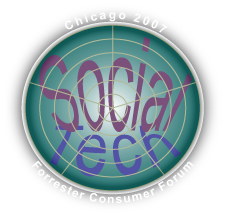 The Global Human Capital Journal’s coverage of the Forrester Consumer Forum 2007 continues with this session on the disruptive power of customers’ Web 2.0 activity. Charlene Li, Vice President and Principal Analyst, Forrester Research, briefed the conference on the disruptive character of consumer empowerment, which she and Josh Bernoff call “groundswell.” She explained why customers were revolting, a “ladder of participation” to describe who is driving the change and some suggestions for turning revolt into reform. The Global Human Capital Journal’s coverage of the Forrester Consumer Forum 2007 continues with this session on the disruptive power of customers’ Web 2.0 activity. Charlene Li, Vice President and Principal Analyst, Forrester Research, briefed the conference on the disruptive character of consumer empowerment, which she and Josh Bernoff call “groundswell.” She explained why customers were revolting, a “ladder of participation” to describe who is driving the change and some suggestions for turning revolt into reform.
The Global Human Capital Journal published the overall conference wrap as well as in-depth coverage of several sessions. Access all through the link to the conference logo (right). Other articles will be published in the days ahead, and we invite you to subscribe to the forum’s RSS feed to be notified as they are published.
I assume that the title’s double entendre was intentional, but in any case, it captures many marketers’ attitudes toward the so-called Web 2.0 revolution. “We don’t want our customers to change. We want to maintain our marketing […]
Case Studies Presage Imminent Adoption of Social Technologies—Emerging Markets Prize In Balance
 A who’s who of global marketing executives convened on the Hilton Chicago October 11-12, 2007 for two days of cramming on social networks, emerging technology and transformation. It certainly felt like an inflection point: analysts’ insights and technology pioneers’ zeal were tempered by corporate stories in the trenches. Based on my experience with previous adoption curves, I predict a significant jump in Web 2.0 adoption by corporations next year. A who’s who of global marketing executives convened on the Hilton Chicago October 11-12, 2007 for two days of cramming on social networks, emerging technology and transformation. It certainly felt like an inflection point: analysts’ insights and technology pioneers’ zeal were tempered by corporate stories in the trenches. Based on my experience with previous adoption curves, I predict a significant jump in Web 2.0 adoption by corporations next year.
Depending on your industry, the next six months will be your last chance to be early to market. As success stories become more widespread and executives realize that Web 2.0 has very low barriers to adoption due to the social Zeitgeist and a relatively low price point, the use of social technologies will rapidly become mainstream. The main barrier to adoption is cultural resistance and organizational inertia.
Although this was not a technology conference, in my conclusions, I will provide some insights about why and how Web 2.0 represents a fundamentally new technology value proposition that makes it […]
Content Providers Hobbled by Conventional Thinking—UGC May Fill Content Vacuum in Plum Mobile Video Market
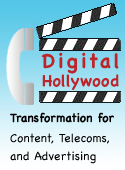 At Digital Hollywood Chicago, speakers held that video would grow significantly as a portion of content experienced on the three screens. However, no panelist gave a compelling reason that video would grow—and there are many problems that will dampen adoption in the short- to medium-term. I question whether they are just trying to drive demand to drive their businesses. Don’t forget that this conference is digital Hollywood. At Digital Hollywood Chicago, speakers held that video would grow significantly as a portion of content experienced on the three screens. However, no panelist gave a compelling reason that video would grow—and there are many problems that will dampen adoption in the short- to medium-term. I question whether they are just trying to drive demand to drive their businesses. Don’t forget that this conference is digital Hollywood.
Myopia is content owners’ biggest problem: they seek to repurpose existing content for the mobile screen to amortize past investments. This logic permeates their thinking and prevents innovation. Meanwhile, consumers are awakening to the excitement of consumer-produced content, the prices of software tools are falling, and skills are increasing. True, the production quality is usually amateurish, but UGC (user-generated content) is usually free, fresh and relevant—to niches, which is where the action is. Users produce content for fun, and they can afford to address topics that “professional” content cannot. Mass-produced vapid content will still have a place in the consumer entertainment universe, but it will decreasingly […]
But Legacy Thinking Makes Agency Ecosystem Vulnerable to Disruptive Change—Who Will Be Their Southwest?
 Technology is remaking the advertising business because it is beginning to enable individualized targeting via automated tools. It is not a moment too soon. Technology is remaking the advertising business because it is beginning to enable individualized targeting via automated tools. It is not a moment too soon.
The ultimate context for this session is that technologies are driving interactivity, which is becoming the default for marketing communications. Legacy players in the marcom value chain have mixed feelings: they want to leverage their investments in legacy processes, people and relationships, and many of their clients are not pushing for interactive or its latest incarnation, digital video.
Thought leaders and visionaries are frustrated by their colleagues’ reticence because they perceive that marketers’ worst fear—irrelevance—will soon ensue unless they begin to make serious investments in digital video and Web 2.0, which highlights peer-to-peer interactivity.
When it burst into public view with the growing popularity of the Internet (“Web 1.0”), “interactivity” represented new capabilities and sensibilities. Viewers of marcom messages could react to the messages by clicking, and these clicks could be tracked very economically.
 However, this was merely a brief overture […] However, this was merely a brief overture […]
|
|
 The Big Switch is a valuable book that reflects what has become Nick Carr’s trademark role, heckling IT and Web enthusiasts, albeit from good seats. Carr seems to relish his role as “the fly in the ointment” of the idealistic IT-enabled world that Web missionaries espouse. Although this book has shortcomings, I recommend it for two reasons. First, Carr makes a convincing and useful argument that the “electrification” of business and society (the Edison part) has valuable lessons for the “computerization” transformation of business and society (the Google part) that is currently unfolding. This parallel provides context to think about some of the disruptions around your business, society and career. Second, Carr raises serious questions about possible privacy implications of computerization. He palpably weighs in on the dark side and seems to want the world to change course from the “googlization of life.” If you haven’t read The Long Tail, I would read these books in proximity because they are very complementary and both quick, important reads.
The Big Switch is a valuable book that reflects what has become Nick Carr’s trademark role, heckling IT and Web enthusiasts, albeit from good seats. Carr seems to relish his role as “the fly in the ointment” of the idealistic IT-enabled world that Web missionaries espouse. Although this book has shortcomings, I recommend it for two reasons. First, Carr makes a convincing and useful argument that the “electrification” of business and society (the Edison part) has valuable lessons for the “computerization” transformation of business and society (the Google part) that is currently unfolding. This parallel provides context to think about some of the disruptions around your business, society and career. Second, Carr raises serious questions about possible privacy implications of computerization. He palpably weighs in on the dark side and seems to want the world to change course from the “googlization of life.” If you haven’t read The Long Tail, I would read these books in proximity because they are very complementary and both quick, important reads.
 Web 2.0 is redefining content on the Web, and Duo Consulting’s and Content Wrangler’s Web Content 2008 Chicago, convened at the UBS Tower on June 17-18, 2008, was a rich opportunity to check in with the Web 1.0-Web 2.0 mashup. Embedded within the legacy concept of “content” (text, pictures, audio, video, etc.) is that few people create it and many people consume it, which is obviously less true with every passing month.
Web 2.0 is redefining content on the Web, and Duo Consulting’s and Content Wrangler’s Web Content 2008 Chicago, convened at the UBS Tower on June 17-18, 2008, was a rich opportunity to check in with the Web 1.0-Web 2.0 mashup. Embedded within the legacy concept of “content” (text, pictures, audio, video, etc.) is that few people create it and many people consume it, which is obviously less true with every passing month. Honestly Assessing Quality—Engaging Consumer Empowerment—Trading in the Ferrari for a Chevy
Honestly Assessing Quality—Engaging Consumer Empowerment—Trading in the Ferrari for a Chevy The Executives’ Club of Chicago fielded an expert panel to brief Midwest executives on Web 2.0’s current and likely impact on one of the most watched U.S. elections in recent history. Marie Cocco, a renowned political columnist, Peter Greenburger, Director of Google’s Elections & Issue Advocacy Team, and Alan Webber, Senior Analyst of Forrester Research brought to bear diverse perspectives on the question at the event, which took place at The University Club on January 31, 2008.
The Executives’ Club of Chicago fielded an expert panel to brief Midwest executives on Web 2.0’s current and likely impact on one of the most watched U.S. elections in recent history. Marie Cocco, a renowned political columnist, Peter Greenburger, Director of Google’s Elections & Issue Advocacy Team, and Alan Webber, Senior Analyst of Forrester Research brought to bear diverse perspectives on the question at the event, which took place at The University Club on January 31, 2008. The Global Human Capital Journal’s coverage of the Forrester Consumer Forum 2007 continues with this session on the disruptive power of customers’ Web 2.0 activity. Charlene Li, Vice President and Principal Analyst, Forrester Research, briefed the conference on the disruptive character of consumer empowerment, which she and Josh Bernoff call “groundswell.” She explained why customers were revolting, a “ladder of participation” to describe who is driving the change and some suggestions for turning revolt into reform.
The Global Human Capital Journal’s coverage of the Forrester Consumer Forum 2007 continues with this session on the disruptive power of customers’ Web 2.0 activity. Charlene Li, Vice President and Principal Analyst, Forrester Research, briefed the conference on the disruptive character of consumer empowerment, which she and Josh Bernoff call “groundswell.” She explained why customers were revolting, a “ladder of participation” to describe who is driving the change and some suggestions for turning revolt into reform. At Digital Hollywood Chicago, speakers held that video would grow significantly as a portion of content experienced on the three screens. However, no panelist gave a compelling reason that video would grow—and there are many problems that will dampen adoption in the short- to medium-term. I question whether they are just trying to drive demand to drive their businesses. Don’t forget that this conference is digital Hollywood.
At Digital Hollywood Chicago, speakers held that video would grow significantly as a portion of content experienced on the three screens. However, no panelist gave a compelling reason that video would grow—and there are many problems that will dampen adoption in the short- to medium-term. I question whether they are just trying to drive demand to drive their businesses. Don’t forget that this conference is digital Hollywood. However, this was merely a brief overture […]
However, this was merely a brief overture […]